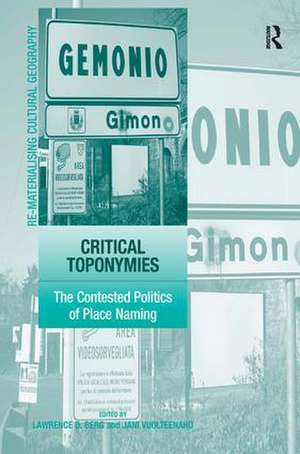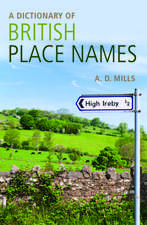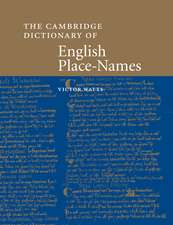Critical Toponymies: The Contested Politics of Place Naming: Re-materialising Cultural Geography
Autor Jani Vuolteenaho Editat de Lawrence D. Bergen Limba Engleză Hardback – 28 sep 2009
| Toate formatele și edițiile | Preț | Express |
|---|---|---|
| Paperback (1) | 460.39 lei 43-57 zile | |
| Taylor & Francis – 17 noi 2016 | 460.39 lei 43-57 zile | |
| Hardback (1) | 1109.18 lei 43-57 zile | |
| Taylor & Francis – 28 sep 2009 | 1109.18 lei 43-57 zile |
Preț: 1109.18 lei
Preț vechi: 1352.65 lei
-18% Nou
Puncte Express: 1664
Preț estimativ în valută:
212.24€ • 222.16$ • 176.65£
212.24€ • 222.16$ • 176.65£
Carte tipărită la comandă
Livrare economică 31 martie-14 aprilie
Preluare comenzi: 021 569.72.76
Specificații
ISBN-13: 9780754674535
ISBN-10: 0754674533
Pagini: 306
Dimensiuni: 156 x 234 x 19 mm
Greutate: 0.45 kg
Ediția:1
Editura: Taylor & Francis
Colecția Routledge
Seria Re-materialising Cultural Geography
Locul publicării:Oxford, United Kingdom
ISBN-10: 0754674533
Pagini: 306
Dimensiuni: 156 x 234 x 19 mm
Greutate: 0.45 kg
Ediția:1
Editura: Taylor & Francis
Colecția Routledge
Seria Re-materialising Cultural Geography
Locul publicării:Oxford, United Kingdom
Cuprins
Contents: Towards critical toponymies, Jani Vuolteenaho and Lawrence D. Berg; Naming as norming: 'race', gender and the identity politics of naming places in Aotearoa/New Zealand, Lawrence D. Berg and Robin A. Kearns; Naming the past: the significance of commemorative street names, Maoz Azaryahu; Street-naming and nation-building: toponymic inscriptions of nationhood in Singapore, Brenda S. Yeoh; Naming and placing the other: power and the urban landscape in Zanzibar, Garth Andrew Myers; The Aloha State: place names and the anti-conquest of Hawai'i, Douglas Herman; Irish place-names: post-colonial locations, Catherine Nash; Proclaiming place: towards a geography of place name pronunciation, Robin A. Kearns and Lawrence D. Berg; Street names as memorial arenas: the reputational politics of commemorating Martin Luther King Jr in a Georgia county, Derek H. Alderman; Indexing the great ledger of the community: urban housing, numbering, city directories and the production of spatial legibility, Reuben S. Rose-Redwood; Planning and revamping urban toponymy: ideological alterations in the linguistic landscaping of Vuosaari suburb, eastern Helsinki, Jani Vuolteenaho and Teri Ainiala; Toponymic silence and Sámi place names during the growth of the Norwegian nation state, Kaisa Rautio Helander; Virtual place naming, internet domains, and the politics of misdirection: the case of www.martinlutherking.org, Derek H. Alderman; Index.
Notă biografică
Dr Lawrence D. Berg is from the University of British Columbia, Canada and Dr Jani Vuolteenaho is from the University of Helsinki, Finland
Recenzii
'Critical Toponymies brings together for the first time under one cover a series of key articles about the control of space through naming practices. From the house to the street to the nation to the globe, place names are laden with human stories, silences, and struggles that continually face off against bureaucratic and linguistic control. If anything, the volume teaches that to name something is not, after all, to know it.' Karen M. Morin, Bucknell University, USA
Descriere
This book brings together recent works that conceptualize the hegemonic and contested practices of geographical naming. Illustrated with a global range of local and national studies, this ground-breaking volume illuminates the key role of naming in the colonial silencing of indigenous cultures, canonization of nationalistic ideals into nomenclature of cities and topographic maps, as well as the formation of more or less fluid forms of postcolonial and urban identities.








